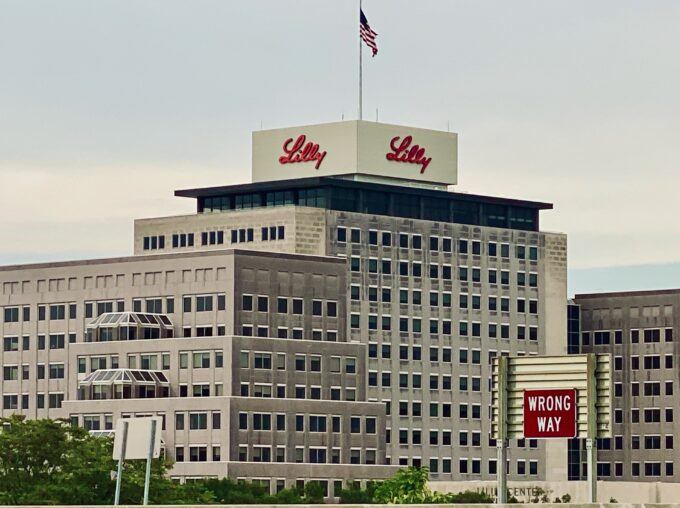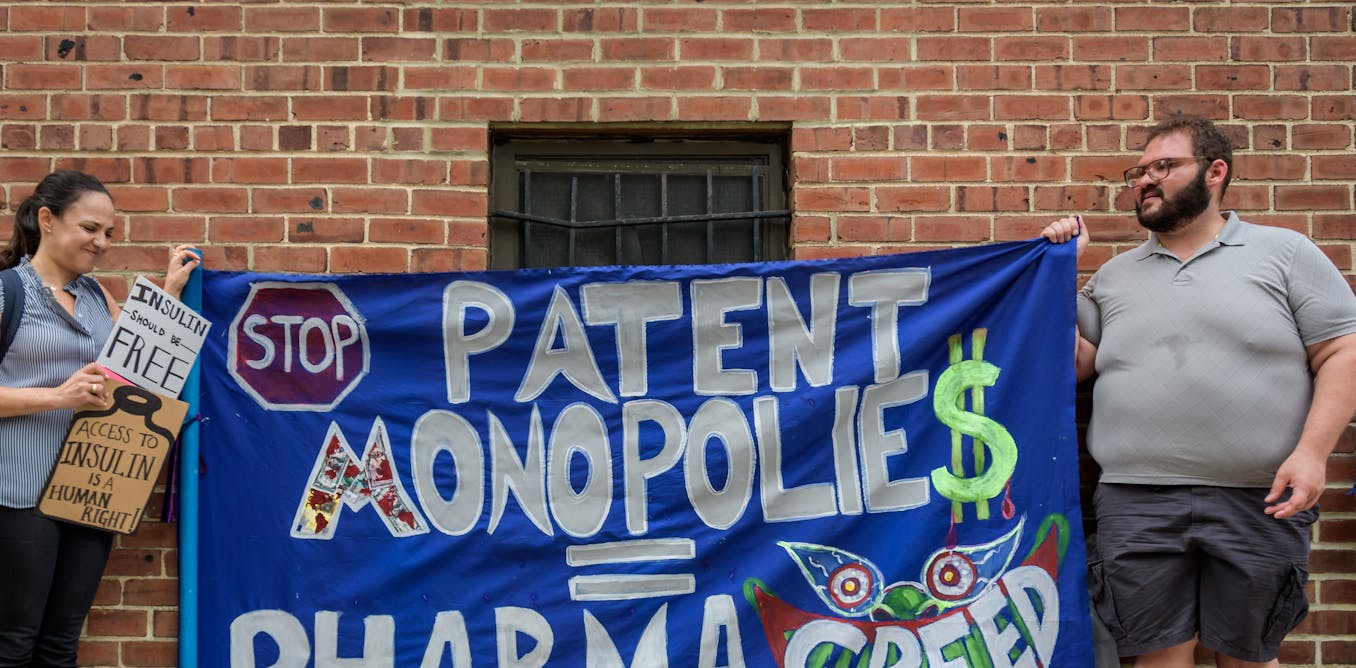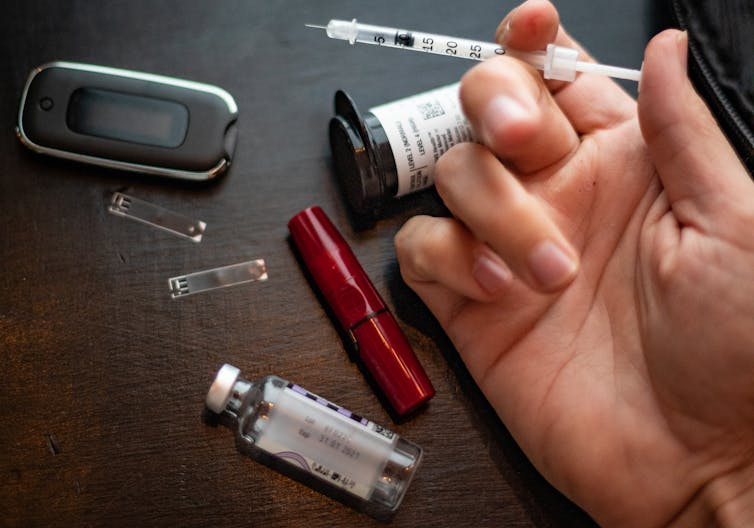
Eli Lilly HQ, Indianapolis. Photo: Jeffrey St. Clair.
The title of Martha Rosenberg’s book – Big Food, Big Pharma, Big Lies – goes right to the heart of her project. The Evanston, Illinois-based Rosenberg – a researcher, journalist, cartoonist and longtime CounterPunch contributor – is taking on more than just the (considerable) damage the drug and agribusiness and food processing companies have wreaked on human and non-human organisms over the last couple of generations. She also delves deeply into the question of how these global corporate leviathans have tried to shape the world to their benefit, doing their utmost to create a culture of complicit doctors, lax regulators and propagandized consumers. All of these actors play a part in sustaining the illusions that keep the big hustle going: e.g., that drug companies and food producers are on our side, that technology is synonymous with progress, that more and newer pills necessarily translates into better health, that what we don’t know about the food we eat and the medications we take won’t hurt us, and that mass advertising of brand-name drugs means a better-informed public.
Big Food is an augmented second edition of Rosenberg’s Born with a Junk Food Deficiency, which came out in 2012. That eye-opening exposé was widely (and mostly favorably) reviewed at the time, including by this writer, who described it in NewCity as “an essential reminder that unless the humane and life-affirming ‘genes’ of accountability, integrity, solidarity, humility and compassion are re-inserted into our society and institutions, the prognosis for our collective well-being is grim.”
Things have only gotten worse in the 12 years since the original edition came out – yet one hears less criticism than in the past, perhaps because, in the post-pandemic era, criticism of the ways of Big Pharma could be misinterpreted as an attack on science. In any event, the flow of new, heavily publicized “diseases” – many of which in the past would have been thought of as minor nuisances – continues unabated, as drug company returns grow while American life expectancy and quality of life decline. Healthcare remains a system in which risks are systematically minimized, non-generic drug prices are grotesquely inflated, and patients are reduced to guinea pigs in the product development and marketing process. From a sociological perspective, Rosenberg’s book is a depiction of the inevitable consequences of a profit-driven medical complex, notably the manufacture of factitious ailments and the over-prescribing of under-tested and potentially dangerous drugs. And on the food side of the equation, we get what Rosenberg aptly terms “the drugstore in your meat” – meat that, at this point, many other countries will not touch.
Well-researched and cogently argued, Big Food, Big Pharma, Big Lies should be on the reading list of every health-conscious person. Penned by an independent reporter with no ties to industry, the book details how corporate wealth – in the form of saturation advertising, MD junkets and honoraria, squadrons of lobbyists and the legalized bribery known as campaign contributions – has corrupted the institutions ostensibly intended to inform and protect us, from the federal regulatory agencies to the universities to the media to the medical profession itself. In the grand old muckraking tradition, Rosenberg reveals to us the underhanded tactics and revolving-door arrangements behind the facade of the so-called “ethical” [i.e., prescription] drug makers, as well as agribusiness. The point is to wake readers from their media-induced trance regarding the vast power and abusive behavior of the industries associated with our two most fundamental needs: health and nourishment.
I communicated with Rosenberg by e-mail about her reissued book and the changes she has witnessed over the dozen years since the first edition came out. What follows is a lightly edited transcript of our Q&A.
What got you interested in this field – i.e., Big Pharma and Big Food – in the first place? Your own encounters with the healthcare system, perhaps?
I probably trace my antipathy toward drug makers to the Pill, which came out in the early 1960s. Some feminists noted that the Pill caused 51 biochemical changes in women–including increased risk of stroke–all because men wouldn’t put on a rubber. Later I worked at Louisiana State University medical school, and I noted more duplicity – including a refusal to call out the carcinogenic nitrites and nitrates in processed meat and water – likely for political and financial reasons.
Your book is about how Big Food and Big Pharma collude with each other to produce a  nation of highly medicated but less than thriving people. How does this process work?
nation of highly medicated but less than thriving people. How does this process work?
As I write in the book, bad food leads people to seek prescriptions for conditions ranging from acid reflux, obesity and diabetes to cardiovascular problems and cancer. Drug makers clean up when people are obese.
However, we may be witnessing a change in the interplay between Big Food and Big Pharma. The advent of GLP agonists like Ozempic and Wegovy has changed the way many people eat. So many people (I should say “rich people,” since the drugs are so expensive) have lost their appetite for fattening junk food that American grocery-buying habits have changed, according to published news reports. Restaurants too have reported a change in patrons’ appetites and preferences.
The GLP agonists have benefited from reports that they reduce addictions and even stroke risks. The cynic in me says they are the new statins. You’ll remember when the statin Lipitor was the bestselling drug in the world and statins were such a medical and Wall Street home run that some people said that the drugs should be added to drinking water. After the statin “gold rush,” when the drugs went off-patent, dangerous side effects were revealed, and medical reports began linking GLP agonists to dangerous gastroenterological effects, which should serve as red flags to anyone paying attention. Surgeons I’ve interviewed, for example, have shared grave concerns about the drugs’ ability to cause delayed gastric emptying.
As you note, disease is now frequently treated as a symptom of drug deficiency, and many doctors are no longer health and lifestyle consultants, but rather harried, over-scheduled drug peddlers. Unless I’m mistaken, it hasn’t always been thus. When and why did things change?
Once upon a time, we had a “concierge” medical business model in which patients paid their doctors directly, and neither insurance companies nor drug makers shaped the economic landscape. Back then, doctors also made house calls.
The economic middlemen have warped the entire purpose of medical care, changing it into a money-making proposition, rather than a way to alleviate disease and pain. As I point out in Big Food, Big Pharma, Big Lies, one of the most dramatic results of this economic takeover is the overriding message that you probably are sick or could be sick and therefore need to “ask your doctor.” Few remember the comforting message that doctors used to intone to nervous patients: “Take two aspirins and call me in the morning” … the point being that you were probably not seriously ill and whatever symptom you had was fairly likely to go away by itself. Now there is money to be made in convincing everybody that they’re ill.
There’s a chapter in the book about the history of hormone replacement therapy (HRT), whose potential side effects – including significantly higher risk of breast cancer, stroke, blood clots, dementia, etc. – have been shown to be much more serious than the menopausal symptoms it treats. Yet on a regular basis, the mainstream media publishes articles extolling the virtues of HRT, as though these large-scale studies about its hazards had never happened. Why does this risky treatment for a non-disease keep rising from the grave, so to speak?
Drug makers seek medications that millions will take most of their lives. They do not make money on short-term prescription like antibiotics (unless they’re used in livestock, which the book addresses). Almost no woman was immune to the drug maker message that aging and menopause were diseases, a message that also played into the sexist premise that an older or less physically attractive woman is worthless. HRT was a cash cow for drug makers who invented the term “perimenopause” so they could start women on the drugs sooner.
When the wheels fell off HRT, drug makers marketed bone drugs to zero in on the one real benefit that HRT could deliver – it strengthened women’s bones. But the bone drugs, called bisphosphonates, were even more pernicious than HRT: by stopping bone turnover, they caused fractures and some women even lost their jaw bones. There are natural and safe treatment for sleep problems, hot flashes and other symptoms of the menopause transition, but drug makers make no money off them.
The book talks about how potent psychoactive drugs are prescribed more and more to the very young, the very old, traumatized returning vets and other captive consumers. What harm does this produce? And is there any trend in the other direction, away from seeing every deviation from a narrowly defined norm as a medicable ailment?
It is estimated that as a much as a quarter of the US population is on antidepressants, which are often prescribed along with other psychoactive drugs. The aggressive marketing of antidepressants has succeeded in redefining what “depression” is and just how “happy” people are supposed to be. If a person isn’t exuberant all the time, there are many possible reasons other than clinical depression, such as a bad job, precarious financial condition, family problems, health status, and certainly social and political issues. The marketing of add-on drugs for “treatment-resistant depression,” which doubles and quadruples profits, can be seen as an admission that the condition was likely not clinical depression to begin with. In fact, about two years ago, definitive research came out of the UK debunking the entire “chemical imbalance” theory on which most psych drugs are marketed.
There’s another downside to the promiscuous marketing of antidepressants, the taking of which now seems almost a rite of passage for young people. Reports now correlate use of SSRI [i.e., selective serotonin reuptake inhibitors] antidepressants with bipolar disorder. It’s only recently that bipolar disorder has become epidemic, a phenomenon that opens up other lucrative prescription avenues. Drug makers prowl social media to make mental illness not just common and acceptable but also cool, and I have personally interviewed young people who are perversely proud of a bipolar diagnosis.
In my opinion, many of the emotional and suicidal problems we now see in young people emanate from the psych drug cocktails they are so routinely given. Young people used to be able to work out their identity questions by themselves. But the process of growing up and finding a solid adult identity is now delayed and sometimes made a permanent challenge by the plethora of psych drugs now being prescribed.
With regard to veterans and active duty service people, I was astounded when I wrote the book to discover how many DOD and VA administrators also served as Pharma consultants, with no firewall at all. Drug makers gravitate toward government entitlement programs such as Medicare, Medicaid and the military because they are an easier sell than to private interests. Taxpayers should be furious.
A major part of your book is about agribusiness, with one chapter titled “The Drugstore in Your Meat.” What are some of those drugs, and what do they do to us?
Few Americans realize that the food sold to us – especially meat – is often banned in other countries. For example, the European Union will not import our hormone-saturated meat, which EU medical officials link to breast and prostate cancer. Asian countries reject the growth drug ractopamine, which is endemic in US agriculture because it produces more weight on animals and thus more profit for meat raisers. To retard bacterial growth, chickens here are dipped in chlorine, which has caused other countries to reject our poultry exports. The notorious “pink slime” – which caused an uproar in US ag markets but is still legal – is made by treating ground beef with ammonia puffs to retard the growth of E. Coli. But ammonia is not allowed in many other countries’ food chains. And vaccines – used to prevent a host of diseases that livestock are susceptible to – are a huge, under-reported part of American meat production. Food animals get dozens of inoculations, and they also ingest heavy metals from other farm medications.
From bird flu to mad cow disease to porcine diarrhea virus to herpes, the diseases that haunt US farms and their treatments would turn any stomach. But news outlets – whose main advertisers are, after all, food companies – seldom report them. Meat producers –especially those who sell “bob” veal [i.e., from newborn calves] – often violate regulations on antibiotics residues. But again, news reports rarely expose these health hazards to consumers, and the information is often available only on little-read government sites.
Why do the regulatory agencies – such as the Food and Drug Administration (FDA) and United States Department of Agriculture (USDA) – do so little regulating and so much kowtowing to corporate power? Would you describe the FDA as a captive agency? Has the drug-testing process been corrupted?
While the FDA has definitely been captured – the Commissioner admitted to 51 financial links to drug makers a few years ago and has gone on record lauding the symbiosis between FDA and Pharma – the USDA was intended to be captured. It was designed to help the agricultural sector and does not presume to serve the public as the FDA is supposed to. Both agencies serve industry over consumers and Congress will do little to help. Why? Because drug makers are among lawmakers’ biggest funders, and lawmakers from ag states are loath to attack the food processors dear to their constituents. There are pure food and drug movements out there, but they are up against tremendous financial forces and need to convince people to vote with their pocketbooks.
Drug testing has become a farce thanks to drug maker machinations. Clinical trials to test if a drug is safe and effective are now run by corporations called contract research organizations (CROs), which are hired by drug companies. CROs design the drug trials, recruit the subjects and help prepare final “submission-for-approval” packages to the FDA. CROs even market new drugs. A few years ago, the largest US-based CRO – Quintiles Transnational – boasted 23,000 employees in 60 countries!
Drug makers often test new products in poor countries, where participants often think they are receiving real medical care and do not realize they are taking a risk. It should also be noted that much, maybe most, drug manufacturing these days is done overseas, where quality issues can and do surface, but production costs are lower.
Your book is about not just bad drugs and bad foods, but also direct-to-consumer (DTC) advertising. This form of attitude-shaping pharmaceutical propaganda, allowed almost nowhere else, permeates TV here. Why is DTC advertising so popular? How does it affect our notions of sickness and health, and the relationship between doctor and patient?
While some medical voices have called for DTC advertising to be made illegal, it’s unlikely to happen, because DTC is probably the most successful marketing vehicle the drug makers have. First of all, advertising works. Second, news outlets and shows are captured by the outrageous revenue these seemingly wall-to-wall DTC ads represent. Third, drug makers no longer have to hire sales reps – who are not always welcomed by doctors – because DTC ads turn viewers into de facto reps, who corner their doctor with the disease they know they have and the drug they know they need thanks to DTC advertising. Ad viewers can be so insistent and adamant in requesting advertised drugs that some medical schools have had to teach doctors what they call “refusal skills.”
Many have pointed out the discrepancy between the laughing, happy models in these ads and the litany of horrific potential side effects – coma, paralysis, brain bleeds, stroke – intoned in the background. It’s been suggested that the “scare track” could somehow perversely sell the drug, in the same way that people are drawn to grisly news stories or murder mysteries.
The original edition of this book came out in 2012. What prompted the update? Have things gotten worse in the last dozen years or so?
Since the first edition of this book, the opioid scandal has erupted, underscoring the corruption and conflicts of interest that characterize the pharmaceutical industry. “Forever chemicals” have become more prominent in food and the environment, with little apparent appetite on the part of regulators to do anything about it. DTC advertising has become so ubiquitous, it sometimes feels like the TV set has turned into one big Pharma Channel. All these trends have gotten worse in the last decade, necessitating a new edition of the book, which I now call Big Food, Big Pharma, Big Lies.
In light of the vast power of the corporate drug and agribusiness industries within a pay-to-play “democracy,” what advice would you give people about protecting their own health?
I recommend that before taking a new drug, do some research on sites such as Public Citizen, the People’s Pharmacy, PharmedOut and AskaPatient. Some well-researched information is available, but you have to dig for it.






 nation of highly medicated but less than thriving people. How does this process work?
nation of highly medicated but less than thriving people. How does this process work?